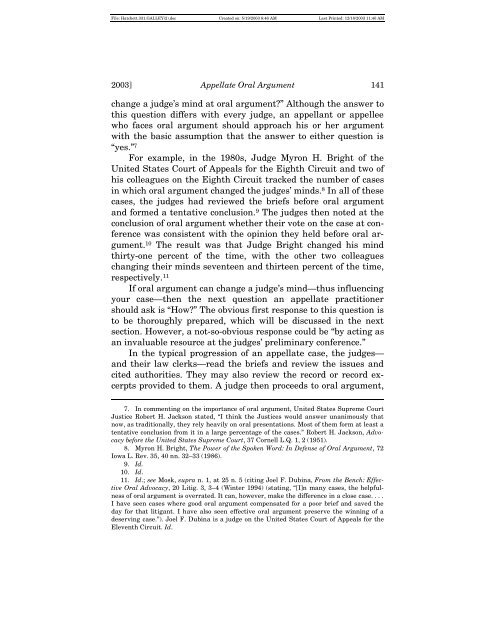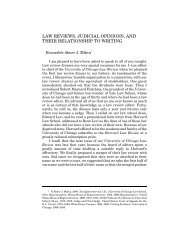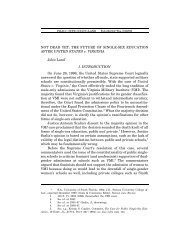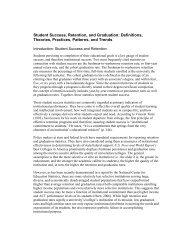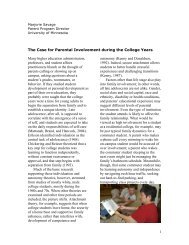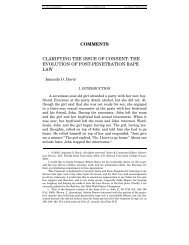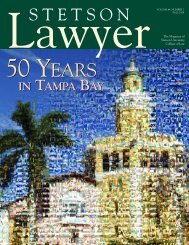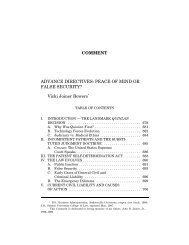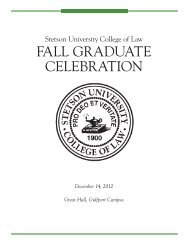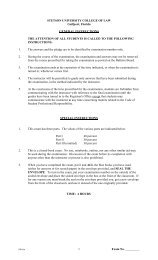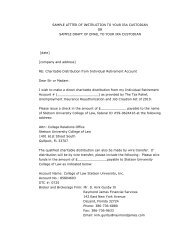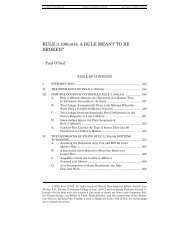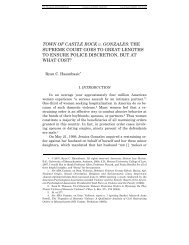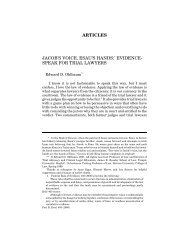THE IMPORTANCE OF APPELLATE ORAL ARGUMENT
THE IMPORTANCE OF APPELLATE ORAL ARGUMENT
THE IMPORTANCE OF APPELLATE ORAL ARGUMENT
You also want an ePaper? Increase the reach of your titles
YUMPU automatically turns print PDFs into web optimized ePapers that Google loves.
File: Hatchett.331.GALLEY(2).doc Created on: 5/19/2003 8:46 AM Last Printed: 12/18/2003 11:40 AM2003] Appellate Oral Argument 141change a judge’s mind at oral argument?” Although the answer tothis question differs with every judge, an appellant or appelleewho faces oral argument should approach his or her argumentwith the basic assumption that the answer to either question is“yes.” 7For example, in the 1980s, Judge Myron H. Bright of theUnited States Court of Appeals for the Eighth Circuit and two ofhis colleagues on the Eighth Circuit tracked the number of casesin which oral argument changed the judges’ minds. 8 In all of thesecases, the judges had reviewed the briefs before oral argumentand formed a tentative conclusion. 9 The judges then noted at theconclusion of oral argument whether their vote on the case at conferencewas consistent with the opinion they held before oral argument.10 The result was that Judge Bright changed his mindthirty-one percent of the time, with the other two colleagueschanging their minds seventeen and thirteen percent of the time,respectively. 11If oral argument can change a judge’s mind—thus influencingyour case—then the next question an appellate practitionershould ask is “How?” The obvious first response to this question isto be thoroughly prepared, which will be discussed in the nextsection. However, a not-so-obvious response could be “by acting asan invaluable resource at the judges’ preliminary conference.”In the typical progression of an appellate case, the judges—and their law clerks—read the briefs and review the issues andcited authorities. They may also review the record or record excerptsprovided to them. A judge then proceeds to oral argument,7. In commenting on the importance of oral argument, United States Supreme CourtJustice Robert H. Jackson stated, “I think the Justices would answer unanimously thatnow, as traditionally, they rely heavily on oral presentations. Most of them form at least atentative conclusion from it in a large percentage of the cases.” Robert H. Jackson, Advocacybefore the United States Supreme Court, 37 Cornell L.Q. 1, 2 (1951).8. Myron H. Bright, The Power of the Spoken Word: In Defense of Oral Argument, 72Iowa L. Rev. 35, 40 nn. 32–33 (1986).9. Id.10. Id.11. Id.; see Mosk, supra n. 1, at 25 n. 5 (citing Joel F. Dubina, From the Bench: EffectiveOral Advocacy, 20 Litig. 3, 3–4 (Winter 1994) (stating, “[I]n many cases, the helpfulnessof oral argument is overrated. It can, however, make the difference in a close case. . . .I have seen cases where good oral argument compensated for a poor brief and saved theday for that litigant. I have also seen effective oral argument preserve the winning of adeserving case.”). Joel F. Dubina is a judge on the United States Court of Appeals for theEleventh Circuit. Id.


